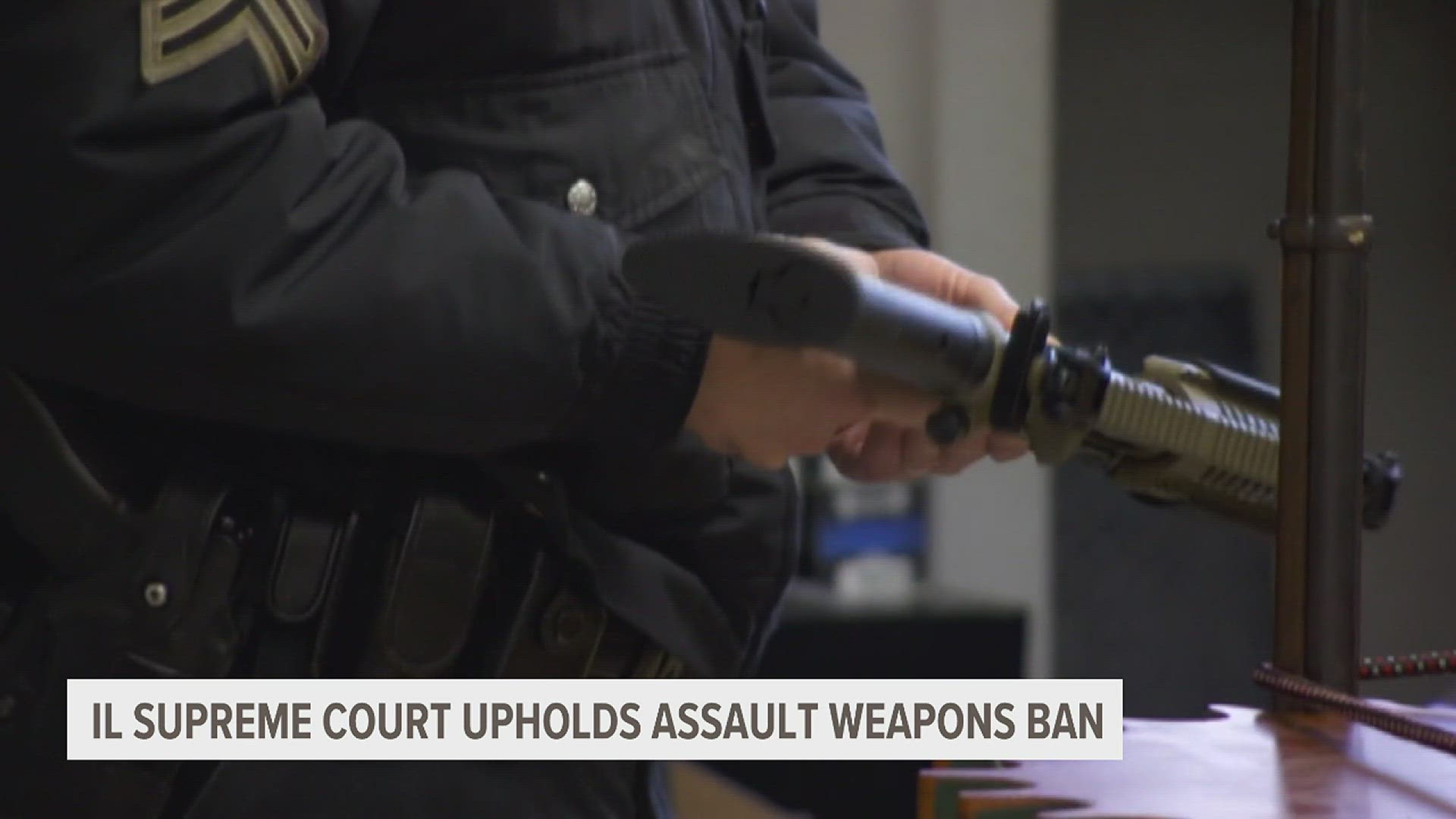SPRINGFIELD, Ill. — On Friday, the Illinois Supreme Court reversed the Macon County judgment which struck down the assault weapons ban.
In March, a judge in Macon County found the Assault Weapons Ban law violated the equal protection and special legislation clauses of the Illinois Constitution.
However, on Friday, Aug. 11, 2023, the Illinois Supreme Court overturned that ruling saying:
First, we hold the circuit court erroneously entered summary judgment for plaintiffs on their equal protection and special legislation claims. Plaintiffs are not similarly situated to the trained professionals. To the extent plaintiffs claim they possess restricted items, they are not treated differently from the grandfathered individuals. To the extent plaintiffs claim they do not possess restricted items, they are dissimilar to the grandfathered individuals, who have a reliance interest in retaining them.
Second, we hold that plaintiffs waived any second amendment challenge to the restrictions, as the complaint did not state a claim and plaintiffs explicitly and repeatedly disclaimed any such argument in the circuit court. Third, we hold plaintiffs’ failure to cross-appeal from the denial of relief under count II bars them from renewing their three-readings claim here. For these reasons, the judgment of the circuit court of Macon County is reversed.
Justice, Holder White dissented from the decision saying, "This great nation was founded on the premise that the right of law-abiding citizens to bear arms is essential to what it means to be a free people." Justice White was joined by Justice Overstreet and Justice O'Brien.
Justice White dissented saying, "because the procedural requirements of the constitution were not met in the passage of HB 5471, I would find the Act unconstitutional in its entirety."
Justice O'Brien dissented saying, "I respectfully dissent because I do not find that the classifications at issue in this legislation further its claimed purpose and it is thus violative of the special legislation provision in our state constitution. "
Illinois Governor J.B. Pritzker issued a statement following the Supreme Court's decision saying:
I am pleased that the Illinois Supreme Court has upheld the constitutionality of the Protect Illinois Communities Act. This is a commonsense gun reform law to keep mass-killing machines off of our streets and out of our schools, malls, parks, and places of worship. Illinoisans deserve to feel safe in every corner of our state—whether they are attending a Fourth of July Parade or heading to work—and that’s precisely what the Protect Illinois Communities Act accomplishes. This decision is a win for advocates, survivors, and families alike because it preserves this nation-leading legislation to combat gun violence and save countless lives.
Background of the Assault Weapons Ban Law:
The Protect Illinois Communities Act (Assault Weapons Ban), restricts firearms and related items defined as an "assault weapon, assault weapon attachment, .50 caliber rifle, or .50 caliber cartridge". It also restricts large capacity magazine. However, there were some cases where the law would not apply. (1) law enforcement agencies and individuals who complete firearms training as part of their employment in law enforcement, corrections, the military, and private security, and (2) individuals who possessed assault weapons or LCMs before the restrictions became effective (grandfathered individuals).
Why the Illinois Supreme Court says it does not deny equal protection or constitute special legislation
First, we hold that the exemptions neither deny equal protection nor constitute special legislation because plaintiffs have not sufficiently alleged that they are similarly situated to and treated differently from the exempt classes. Second, plaintiffs expressly waived in the circuit court any independent claim that the restrictions impermissibly infringe the second amendment. Third, plaintiffs’ failure to cross-appeal is a jurisdictional bar to renewing their three-readings claim. Accordingly, we reverse the circuit court and enter judgment for defendants on the equal protection and special legislation claims. We express no opinion on the potential viability of the plaintiffs’ waived claim concerning the second amendment.
You can read the Illinois Supreme Court's full opinion by clicking here.
Watch more news, weather and sports on News 8's YouTube channel

